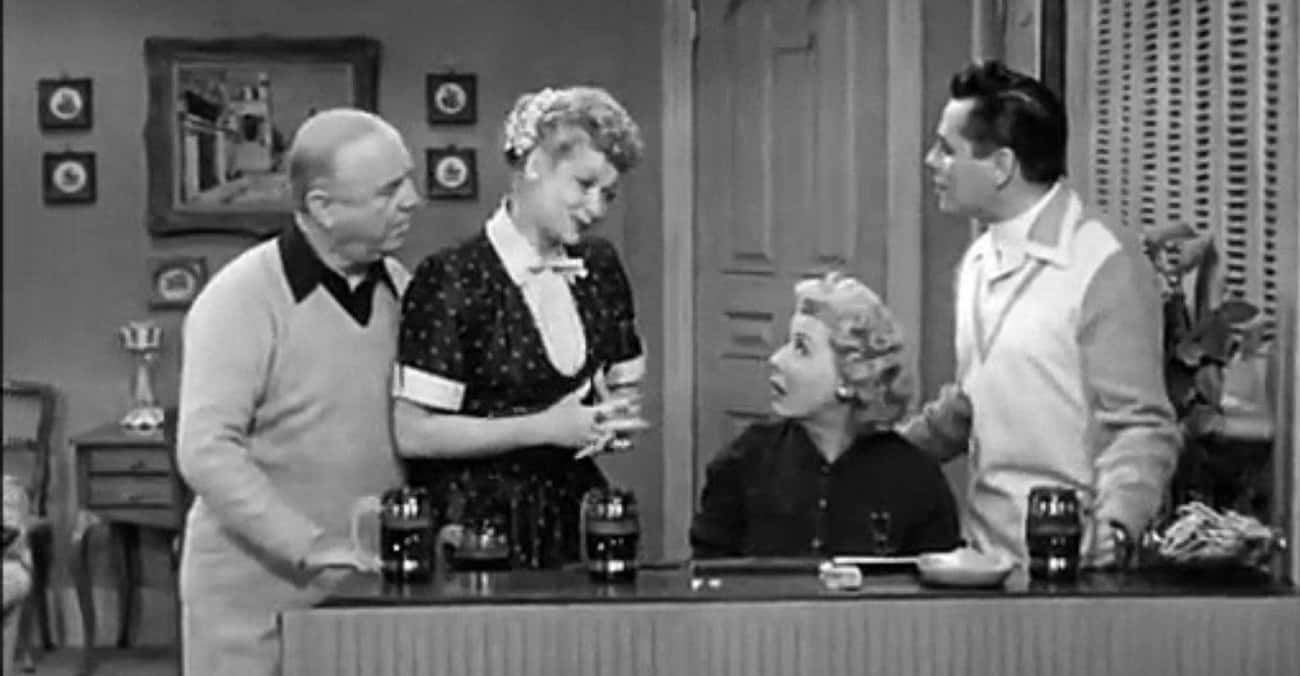Must-Read Facts About Television Syndication
- 1182 VOTES
The Stars of I Love Lucy Basically Invented Syndication
Photo: CBSLucille Ball and Desi Arnaz made reruns commonplace, and without reruns, there would be no syndication. The I Love Lucy duo made a deal with CBS in 1951 to produce the show on higher-quality film instead of the industry-standard blurry kinescope, allowing for decent looking reruns down-the-road (kinescope's quality wasn't up to snuff for repeated viewings). The couple also later struck one of the first major syndication deals in TV history when they sold 180 episodes of I Love Lucy to CBS for $5 million ($19.5 million today). - 2121 VOTES
Star Trek: TNG Is the Only First-Run Syndicated Show to Receive an Emmy Nom for Best Drama
Photo: CBSFirst-run syndicated TV dramas just don't get the respect of network shows, especially at the Emmys. In fact, Star Trek: The Next Generation is still the only first-run syndicated show that has ever been nominated for a Primetime Emmy Award for Outstanding Drama Series. Paramount took a big risk by launching the show in syndication, but it sure paid off: the show became a huge financial and critical success for the studio. - 3189 VOTES
Seinfeld Has Generated More Than $3 Billion in Syndication
Photo: NBCSeinfeld is unquestionably the most successful second-run syndicated show of all time: the show has generated over $3.1 billion (that's right: billion) in syndication fees since NBC aired the last episode in 1998. Not bad for a "show about nothing" that the president of NBC thought was "too New York" and "too Jewish" when he agreed to a measly four-episode run back in 1989. Jerry Seinfeld himself, by the way, has earned an estimated $400 million from syndication alone. - 4138 VOTES
Syndication Can Be a Very Lucrative Business
Photo: CBSThere's big money to be made in syndication - especially for 2 Broke Girls. The syndication rights to the CBS sitcom were sold to TBS in 2012 for a record-setting $1.7 million per episode, the most ever for a half-hour sitcom. The Big Bang Theory pulled a big $1.5 million in 2010, while Modern Family sold to USA for $1.4 million in 2010. Hour-long shows do even better: three CSI shows were all sold for more than $1 million per episode, and The Sopranos and Hawaii Five-0 each pulled $2.5 million. - 5171 VOTES
Some Syndicated Shows Are Sped Up to Allow for More Commericials
Photo: NBCMost contemporary sitcoms run around 21 or 22 minutes, with about eight minutes left over for ads. Older sitcoms like Seinfeld, however, originally ran for 25 minutes with only five minutes for commercials. So how does a network like TBS handle this potential loss of revenue when they air syndicated Seinfeld reruns? They speed up the show! It may sound crazy, but the episodes you see on TBS are actually several minutes shorter to free up room for ad space. They're subtle, but the cuts are there. So much for timing being the key to comedy... - 6113 VOTES
Major Dad Made Syndication History
Photo: NBCNBC's Major Dad may not have the massive following of a Friends or Seinfeld, but it did make TV history when it became the first off-network comedy to go straight to cable. The military family sitcom aired on the USA Network instead of the more traditional route of being sold to local broadcast stations for syndication. Back in 1993 it also set a record cable syndication price of $600,00 per episode. - 7110 VOTES
The Simpsons Is Butchered in Syndication
Photo: FOXLike Seinfeld on TBS, basically any syndicated episode of The Simpsons you see is heavily edited to allow for more commercials. Unlike Seinfeld, however, fans of The Simpsons have been keeping track of the edits, and the results aren't pretty: jokes have been cut left and right and many episodes feature scenes that don't really make sense anymore. When FXX aired its #EverySimpsonsEver marathon in 2014, the network aired the original, intact episodes... but then again aired the hacked-up episodes when the show was aired in regular rotation. - 8115 VOTES
Some Network Shows Are Created with Syndication in Mind
Photo: FXIt's called the "10/90 Model": take a couple of tried-and-true TV stars (such as Kelsey Grammar and Martin Lawrence) and give them a sitcom with a premise designed for longevity (such as the storytelling-friendly courtroom setting of FX's 2014 flop Partners). Once the pieces are in place, make a deal with the network that if the first 10 episodes do well in the ratings, 90 more episodes will be ordered, allowing the show to have enough episodes to sell into syndication.
What's wrong with this model? Critics say it values episode quantity over quality and leads to forced, formulaic storytelling (the quickly-cancelled Partners, for example, picked the stars before the premise). - 9101 VOTES
Wheel of Fortune Is the Longest-Running Syndicated Game Show
Photo: Califon Productions, Inc.More than 6,000 episodes of the syndicated word puzzle game show Wheel of Fortune have aired since 1983, making it the longest-running syndicated game show currently on the air. The show originally aired on NBC from 1975-1980, but the syndicated version - with hosts Pat Sajak and Vanna White - is the version that quickly became one of America's favorites. It was a rough start, though: in its first year, only 50 markets carried the show (the largest being Philadelphia). By 1984, however, 99% of TV households were able to watch! - 1082 VOTES
DuckTales Was the First Syndicated Disney Cartoon
Photo: DisneyCartoon giant Disney didn't debut an animated show in first-run syndication until DuckTales in 1987, but when it did, it made a splash! The show ran for four seasons and 100 episodes and paved the way for other Disney afternoon fare such as Chip 'n Dale Rescue Rangers, TaleSpin, and Darkwing Duck. The beloved series also spawned several video games (including a stone-cold classic for the NES) and a feature film. - 1179 VOTES
88 Is a Magic Number in the World of Syndicated TV
Photo: ABCEveryone used to cite 100 as the magic number of episodes needed for second-run syndication, but these days, 88 is where it's at. Why? Most network comedies and drama average about 22 episodes per season, so the thinking is that four seasons will make the investment worthwhile. It equals out to about five months' worth of programming if a show is aired every day, Monday through Friday. - 1295 VOTES
Syndicators Can Show Episodes In Any Order They Please
Photo: NBCFans of one-camera comedies like The Office, who are intimately familiar with their season-long story arcs (Pam + Jim 4 Life!), have a nasty surprise in store if they ever catch their favorite shows in syndication on networks like TBS: the shows are aired wildly out of order. A Season 2 episode will air the night after a Season 5 finale, for example, and there's seemingly no method to the madness. Older, multi-camera sitcoms with more "self-contained" storytelling could get away with this, but The Office? The reality (via Slate) is that it's in the station's best interest to mix things up, for a number of reasons:
- Some episodes are more popular than others, so it pays to play them more often.
Don't like the chaotic nature of syndication? There's always Netflix, Hulu, or box set DVDs.
- Holiday episodes do better during the actual holidays, chronology-be-damned.
- Sometimes stations don't have the entire series available to them, so they work with what they have. - 1375 VOTES
The Hope of Syndication Can Save Even Failing Shows
Photo: FOXShows that are coming close to that magic 88 episode mark are sometimes saved from cancellation even if they have horrible ratings. Case in point: FOX's 'Til Death, which was renewed by the network for a fourth season even though no one was even watching it (leading to some "interesting" choices by the producers). Why save a show that no one watches? In the case of 'Til Death, Sony offered FOX a break on licensing fees to make renewal more appealing and to get the show closer to 88 episodes, hoping for a lucrative syndication deal. - 1478 VOTES
Many Syndicated Shows Are Retitled
Video: YouTube Do you remember Happy Days Again? What about CSI: Las Vegas? Timmy and Lassie? If these titles seem odd to you, you probably haven't watched a lot of syndicated reruns. Many popular shows were retitled for syndication so as to not confuse viewers who were still watching new episodes every week. So Happy Days, for example, became Happy Days Again so it would be clear that the Fonz didn't actually age in reverse or something. Viewers have since grown savvier about such things, thankfully.
Do you remember Happy Days Again? What about CSI: Las Vegas? Timmy and Lassie? If these titles seem odd to you, you probably haven't watched a lot of syndicated reruns. Many popular shows were retitled for syndication so as to not confuse viewers who were still watching new episodes every week. So Happy Days, for example, became Happy Days Again so it would be clear that the Fonz didn't actually age in reverse or something. Viewers have since grown savvier about such things, thankfully. - 1554 VOTES
First-Run Syndicated Shows Stay on the Air for a Long Time
Photo: CBSFirst-run syndicated shows are among some of the longest-lasting shows on the air. In 1987, for example, Wheel of Fortune, Jeopardy!, Oprah, and Entertainment Tonight were all some of the most popular shows on TV. In 2016, that was still basically true (except Oprah Winfrey now has her own network instead of just a talk show). Other long-running first-run syndicated shows include news magazines like Extra, courtroom shows like Judge Judy, and talk shows like Dr. Phil. - 1679 VOTES
Judge Judy Is the Highest-Rated Show in Syndication
Photo: CBSJudge Judy is a juggernaut: the syndicated courtroom series was the highest-rated syndicated show in the United States each year from 2011 to 2016. This means that Judy gets more viewers than any talk, variety, comedy, or drama show currently in syndication (including insanely popular shows like Wheel of Fortune and Dr. Phil). She's not going anywhere anytime soon, either: her contract ensures new Judy until at least 2020. - 1768 VOTES
Stations Were Forced to Bid on Syndication Rights to The Cosby Show
Photo: NBCViacom International played some serious hardball with the syndication of its property The Cosby Show, one of the most popular sitcoms of all time. Local stations that wanted to air the show were told a minimum price Viacom would accept and then were only given 48 hours to make a bid. The rights didn't come cheap: the show cost $16,500 per episode in the San Diego market (compare that to an "average sitcom" price at the time of $3,000 to $7,500). - 1865 VOTES
Even Censored, The Sopranos Killed in Syndication
Photo: HBOHBO has a weird history with syndication. How can a premium cable network known for its nudity, violence, and profanity successfully sell its old shows to networks forced to censor such content? A&E took a huge risk in 2005 when they bought the gritty and violent The Sopranos for $2.55 million per episode, but the risk paid off: even with censored and alternate content, the show's basic cable debut landed a record 4.3 million viewers. - 1963 VOTES
Syndication Saved Baywatch
Video: YouTube Love it or hate it, Baywatch was at one point one of the world's most popular TV shows, and syndication is almost entirely to thank for that. NBC cancelled the show after just one season in 1990, but it got a new life in weekly syndication shortly thereafter, airing for 10 more seasons in more than 100 countries. Reruns of the first-run syndicated series were also syndicated as part of a deal with the USA Network in 1997.
Love it or hate it, Baywatch was at one point one of the world's most popular TV shows, and syndication is almost entirely to thank for that. NBC cancelled the show after just one season in 1990, but it got a new life in weekly syndication shortly thereafter, airing for 10 more seasons in more than 100 countries. Reruns of the first-run syndicated series were also syndicated as part of a deal with the USA Network in 1997. - 2053 VOTES
Season Two of The Wire Was Heavily Edited in Syndication
Photo: HBOWhen BET aired HBO's The Wire in 2007, the network decided to cut about 20 minutes from every Season 2 episode. Why season two? Some critics say it's because the African-American network thought the largely white cast in Season 2 wouldn't play well to their demographic. Regardless, the cuts created huge plotholes, rendering parts of the show nonsensical for viewers watching it for the first time. - 2149 VOTES
Entertainment Tonight Was the First Syndicated Show Distributed Via Satellite
Photo: CBSThe longest-running entertainment news show on television (syndicated or otherwise) also has the distinction of being the first syndicated show to be distributed via satellite. Debuting in 1981, the show has been a technological pioneer for decades, and made the switch to high-definition before any other magazine news show in 2008. ET has always been a first-run syndicated product - in fact, creator Alfred Masini was fresh off the success of another syndicated show (Solid Gold) when he developed it.










































